Morocco is back in the African Union. What awaits Western Sahara?
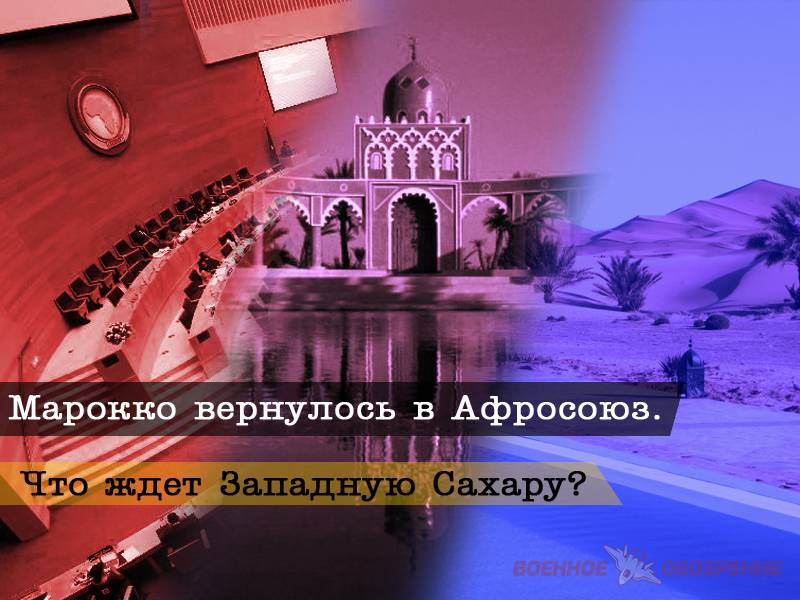
January 2017 of the year ended with a significant event, which was reported by many world media, but which, in our opinion, was left without proper attention. This is about the return of Morocco to the African Union. 30 January 2017, the XXVIII Congress of the African Union (AU), held in Addis Ababa, by a majority vote supported the return of Morocco to this transnational organization uniting the African continent. We will describe below what caused the more than thirty-year break with Morocco’s membership in this organization and what may change after Morocco’s return to the AU.
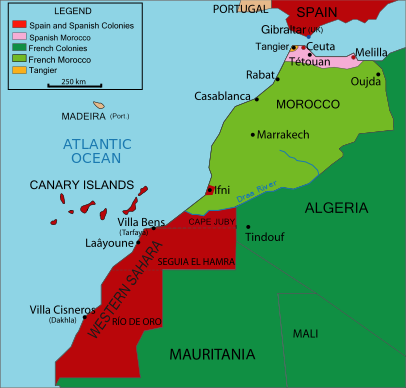
In the 1984 year, exactly thirty-three years ago, Morocco announced its withdrawal from the Organization of African Unity (OAU), the predecessor of the African Union. This decision was one of the most important countries in North Africa due to the most serious political crisis at that time - the events around Western Sahara. The former Spanish colony, Western Sahara did not become an independent state. Much larger neighbors - Mauritania and Morocco - claimed these lands. Although the roots of the crisis went back to the 19th century, when Spain began the colonization of the Saharan coast, its aggravation followed the processes of decolonization. Spain one of the last European powers got rid of their African possessions. 6 November The 1975 of Morocco organized the Green March - a mass demonstration of thousands of people for the withdrawal of the Spanish administration from Western Sahara, and on November 18 Madrid really began the withdrawal of its civilian and military personnel from the colony. As a result of the 2 / 3 Green March, the territories of Western Sahara came under the control of Morocco, and the remaining southern 1 / 3 moved to Mauritania. But the division of Western Sahara was faced with opposition from the Saharans themselves, many of whom hoped to create their own independent state and did not intend to submit to Morocco or Mauritania.
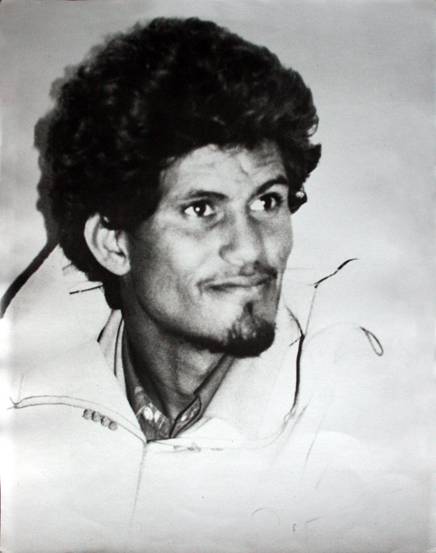 Back in May, 1973, two years before decolonization, a group of students created the Popular Front for the liberation of Segiet el Hamra and Rio de Oro (Frente POLISARIO). Its founder was El-Wali Mastafa Sayyed (1948-1976), who studied in Morocco and was in a radical anti-imperialist position. The Polisario Front enlisted the support of Algeria and Libya, who sympathized with the Sahara people's liberation movement not only for ideological but also purely pragmatic reasons — they saw the struggle of the population of Western Sahara as a tool to weaken Morocco. In 1973-1975 a few detachments of the Front of the Polisario led the partisan struggle against the Spanish administration, and after the decolonization of Western Sahara they continued to fight against the Mauritanian and Moroccan troops. 27 February 1976 of the Year Front Polisario proclaimed the independence of the Saharan Arab Democratic Republic (SADR).
Back in May, 1973, two years before decolonization, a group of students created the Popular Front for the liberation of Segiet el Hamra and Rio de Oro (Frente POLISARIO). Its founder was El-Wali Mastafa Sayyed (1948-1976), who studied in Morocco and was in a radical anti-imperialist position. The Polisario Front enlisted the support of Algeria and Libya, who sympathized with the Sahara people's liberation movement not only for ideological but also purely pragmatic reasons — they saw the struggle of the population of Western Sahara as a tool to weaken Morocco. In 1973-1975 a few detachments of the Front of the Polisario led the partisan struggle against the Spanish administration, and after the decolonization of Western Sahara they continued to fight against the Mauritanian and Moroccan troops. 27 February 1976 of the Year Front Polisario proclaimed the independence of the Saharan Arab Democratic Republic (SADR). Since the territory of Western Sahara was not part of any other state before the Spanish colonization, the very fact of annexing the Saharan lands of Morocco and Mauritania was recognized as a violation of the UN Declaration No. 1514 “On Granting Independence to Colonial Countries and Peoples”. Morocco and Mauritania prevented a referendum in order to identify the attitude of the Saharan population to the issue of independence. The Front Polisario relied on these facts in an effort to present its struggle as legitimate in the eyes of the world community.
Mauritania, which had very limited resources and a weak and poorly armed army, was soon unable to bear the heavy burden of war. In 1978, the head of the general staff of the Mauritanian army, Colonel Mustafa Ould Mohammed Saleh, carried out a military coup and overthrew the country's president, Moctar Ould Daddou. After that, Mauritania announced a course to end hostilities in Western Sahara. 3 April 1979 in the country there was a new military coup. Lt. Col. Mohammed Mahmoud Ould Ahmed Luli 5 August 1979, who led the Military National Rescue Committee, signed an agreement on the rejection of territorial claims to Western Sahara with representatives of the Polisario Front. Two weeks later, the treaty with Morocco was denounced. Moroccan troops were withdrawn from the territory of Mauritania. So Morocco was left alone with the problem of Western Sahara. However, the Moroccan authorities did not lose their head. Moroccan troops immediately occupied the southern part of Western Sahara, formerly part of the Mauritanian sphere of influence. The number of Moroccan troops in Western Sahara exceeded 100 thousands of people. And yet the Front Polisario continued active resistance, getting weapon from Algeria and enlisting the moral support of socialist and anti-imperialist organizations throughout the world. The vast eastern territories of Western Sahara were under the control of the Polisario, while the economically key centers of the region remained in the hands of the Moroccan armed forces.
Algeria remained the key ally and patron of Western Sahara in this situation. Firstly, the national liberation struggle of the Saharans was considered by Algeria as an analogue of its own struggle against French domination. Secondly, Algeria and without Western Sahara had significant contradictions with Morocco. For example, in 1963, there was a direct armed conflict between Algeria and Morocco, which entered into history as "Sand war". It was caused by territorial disputes around the regions of Tindouf province in western Algeria, where there were rich deposits of iron ore. Then Cuba came to the aid of Algeria, sending its military contingent to North Africa. Large-scale war was prevented. However, tensions in Algerian-Moroccan relations remained. Morocco regards Algeria’s support to the Front of the Polisario as a manifestation of mediated war in order to weaken Moroccan positions in Africa.
The history of the struggle for self-determination in Western Sahara is also connected with the world recognition of this public entity. Algeria, Angola, Mozambique and North Korea recognized as one of the first, back in 1976, the independence of Western Sahara. Then the list of countries that recognized SADR as a sovereign state gradually expanded to 59 states. Basically, in this list are the countries of Africa, Asia and Latin America, themselves having passed the path of the national liberation struggle. In 1984, Mauritania also recognized independence of SADR. 12 November 1984 The Sahara Arab Democratic Republic was recognized by the Organization of African Unity (OAU), a transnational organization uniting the majority of African countries. After this decision, Morocco left the OAU ranks, finding it impossible for them to remain in the ranks of this structure. For more than thirty years, Morocco did not participate in the activities of the Organization of African Unity and the African Union created in 2002 instead of the OAU. This circumstance, of course, affected African policy, since Morocco is one of the most developed and authoritative countries of the continent.
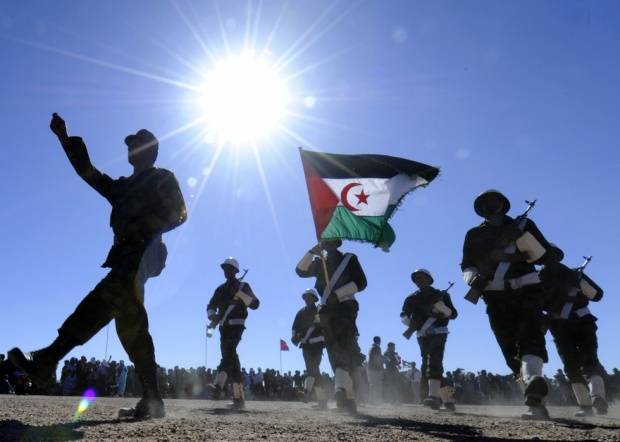
The conflict in Western Sahara forced Morocco to invest heavily in financing the grouping of Moroccan armed forces involved in the territory of the belligerent region. In addition, the construction of a developed system of berm defensive fortifications, which allowed the part of Western Sahara controlled by the Moroccan army, to be controlled by the Polisario, was also made serious money. In 1989, the king of Morocco, Hassan II, held several meetings with the top leadership of Polisario, which led to the conclusion of a long-awaited truce in 2002. But, nevertheless, Western Sahara remained a zone of conflict. Up to the present, it has been divided between Morocco and SADR, with Moroccan armed forces and units of the Sahara People’s Liberation Army in its territory. This situation creates many additional problems for Morocco and the region as a whole. Among the immediate problems for Morocco are enormous financial spending, the need to maintain a huge military grouping in the Sahara, the risk of a resumption of hostilities, problems in foreign relations with a number of countries in Africa, Asia and Latin America.
The presence of an unstable region is another “bomb” under the Sahara and Sahel zone, which has not been stable in recent years. In Mali, Tuareg and radical fundamentalist organizations are fighting, periodically terrorist attacks occur in the countries of West Africa, in Nigeria, the authorities are trying to crush the resistance of Boko Haram radicals. With the spread of radical fundamentalist ideas in North and West Africa, the territory of the Sahara has become the subject of increased attention of terrorist groups. The leftist ideology is losing ground on the African continent, especially after the defeat of the Libyan Jamahiriya and the brutal murder of Muammar Gaddafi, who at some time also provided direct support to the Front of the Polisario. Therefore, it is possible that sooner or later more dangerous and radical organizations can replace the anti-imperialist movement of the Polisario. In this situation, the resolution of the Sahara conflict is one of the most important conditions for preventing the spread of terrorism in the region.
The Sahara and Sahel are experiencing many socio-economic, environmental, political problems. It is clear that the African Union would be much easier if Morocco, a country that has one of the strongest armies in the region, is relatively developed and financially stable by the standards of other states of the continent, took part in their decision. Moreover, the entry of Morocco into the African Union would also facilitate the task of coordinating actions in the fight against terrorism, which has become one of the most important problems of the region. On the other hand, membership in the African Union is beneficial to Morocco itself. First, the African Union until January 2017 united all African countries except Morocco. Only in 2013 was the membership of the AU of the Central African Republic suspended - and then only because of the chaos that began in that country as a result of the civil war. Joining the African Union will allow Morocco to pursue a more active foreign policy on the African continent, and even become one of the leaders of African politics, since, after the overthrow of Gaddafi, Libya’s influence has significantly weakened.
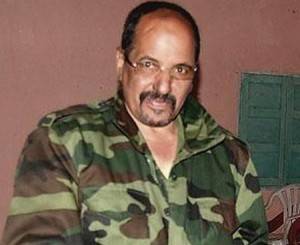
Secondly, membership in the AU allows Morocco to protect its interests and regarding the status of Western Sahara. More active participation in African politics allows Rabat to influence the opinions of other countries - participants of the AU and, possibly, to achieve certain goals. One more important circumstance should be taken into account. 31 May 2016 in Tindouf in Algeria, 69, died of lung cancer Mohammed Abdelaziz (pictured) - the first president of the Saharawi Arab Democratic Republic, the second and permanent leader of the Front Polisario, in 1976, replaced the founder of the organization of the deceased El Ouli Mastafu Sayed. Abdelaziz headed the Polisario for forty years. He was considered one of the most irreconcilable politicians of the "old school", brought up on left-wing and revolutionary ideas. He condemned the activities of religious fundamentalists, was opposed to terrorism and believed in the national and social liberation of the people of Western Sahara. In turn, in Morocco, Abdelaziz, who lived in Algeria, was considered as an agent of Algerian influence, which is not surprising - after all, the headquarters of Polisario is based in Algeria.
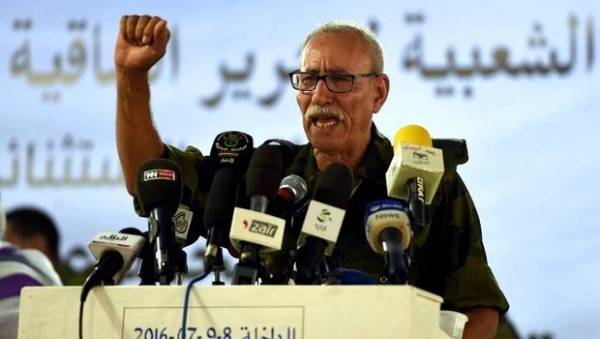
However, who replaced Abdelaziz as president of SADR and secretary general Polisario Brahim Ghali (born 1949) was also one of the veterans of the Saharan people's liberation movement, who had been at his source and had participated in actions of Saharan patriots since the end of 1960, even before Polisario creation. 2008 to 2016 Brahim Ghali was the representative of SADR in Algeria, that is, in fact, he was responsible for the relationship between Polisario and his most important patron, the Algerian authorities. It is difficult to expect that Brahim Ghali will pursue the pro-Moccanian policy, given that relations between Algeria and Morocco cannot be called good.
In the summer of 2016 in Morocco, they started talking about the imminent return of the country to African politics. In September 2016, the kingdom filed a formal application to join the African Union. Of course, the prospects for the adoption of Morocco were discussed before that, otherwise the government of the kingdom would not file an application, fearing discredit in the event of non-acceptance. That is, Rabat already knew that the majority of members of the African Union will take a loyal position towards Morocco.
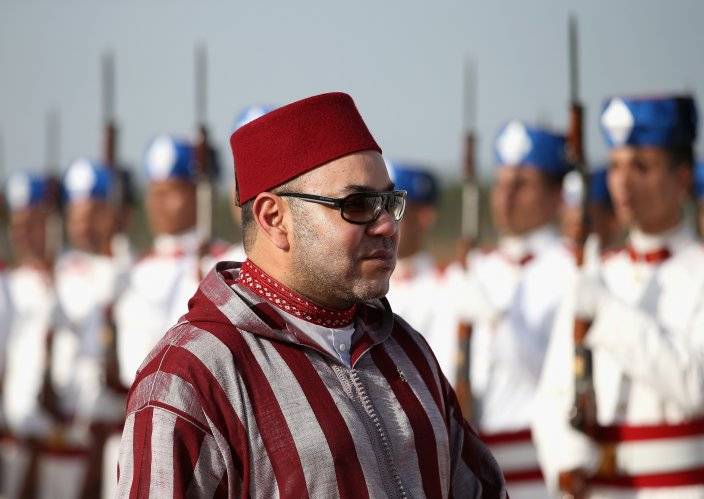
Although 30 January 2017, Morocco returned to the African Union, the Saharan issue remains unresolved. This, by the way, was also noted by the heads of African states present at the congress in Addis Ababa. Thus, the President of Senegal, Maki Sall, linked the prospects for solving the Sahara issue precisely with the return of Morocco to the family of African states. However, unity on the question of the return of Morocco to the African Union was never achieved. Although Rabat’s membership was restored, 39 from 54 of the African Union member countries voted for it. Nor is it very clear how Morocco will now build relations with the Polisario Front - after all, Rabat does not recognize the independence of SADR, and meanwhile, the republic is recognized by most African countries and is a full member of the African Union. Ultimately, it is possible that it is the return of Morocco to the AU that will allow the Saharan conflict to be resolved in the long term - as practice shows, if the “world community” represented by the United States, the United Nations and European countries does not interfere in African politics, then very often the African leaders themselves make quite adequate and balanced decisions that benefit both their countries and the continent as a whole.
Information